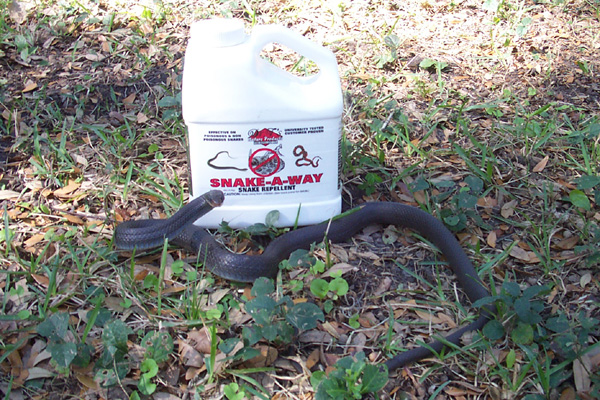- USA Wildlife Removal Education Guide and Resources
Snake Repellents - Do they Work?

Most stores that have a garden center have some form of snake repellent on the shelves. Most of these products contain sulfur or naphthalene (moth balls) and a host of other, inert ingredients. The bottles will be covered in appealing lettering and promises about how the product will repel snakes. Unfortunately, none of these remedies really work. There are only two repellents that are currently used and have some reliable results: mongoose urine and kingsnake musk. The problem is that neither of these substances is available to a person without a license. If you're going to hire a professional to bring in professional-grade repellents, you might try starting with some less expensive home care. Property upkeep is the primary way to repel snakes. You want to eliminate any tall vegetation or thick areas in your home gardens. Do not leave debris around your yard. Woodpiles, stone fences, patio rocks, and decorative stone are all ideal locations for a snake den. You can keep these areas if you want to, but you should make sure to keep the area around them as trimmed as possible. A snake is not going to want to crawl through short grass to get to a garden. A short lawn will provide no protection from the heat or from predators.
Snake repellent ultrasonic sound machine - Of all the snake repellents on the market, the ultrasonic noise devices are the silliest, as silly as moth ball snake repellents. The logic behind these devices is more reasonable when applied to animals that actually hear sounds, like rodents. Snakes do not hear like mammals or humans hear. These animals rely on vibrations rather than actual noises. What they can hear is not at a pitch that would be considered ultrasonic. The fun thing about ultrasonic repellents is that you can never tell if they are working or not. You're not supposed to be able to hear the sound, so how will you ever know if the darn thing is on? Instead of goofing around with devices like these, put your time toward examining the outside of your home. It is not your house that needs the first glance, though any cracks and damaged areas should be repaired as soon as possible. To get to your home, the snake must first pass through your yard. For most of these animals, that open distance is exceptional. Long grass is the bane of many a homeowner that dislikes snakes. Not only is long grass cool on the snake's skin, it provides protection and concealment. Long grass will also bring in an abundance of prey animals for the serpent. Even though gardens and debris are important to remove, keeping your grass short will make a world of difference.
Rope as snake repellent - Rope does not work as snake repellent. The theory behind it is that the fibers of the rope are too coarse on the underbelly of the snake, poking the reptile through the scale joints. The reality of the snake world is that snakes live in the wild; they crawl over all types of terrain. There is nothing special about a rope that will bother them. The rope repellent trick goes back to when cowboys used to sleep on the trails at night. The fear was that the snakes would be drawn to body heat, curling up with the riders while they slept. One wrong move meant a deadly bite. Rope didn't work any better for them than it does for today's homeowner. If you want to repel snakes, the only thing you can do is to modify your lawn and gardens. Keep your vegetation trimmed and your grass short. Snakes want to be in thick cover, and they want to visit yards where there are lots of places to hide. When you eliminate these factors, the snakes will start to look elsewhere for their hunting.
Go back to the main Snake Removal page for more information about what snake droppings and feces look like.
If you want to do it yourself, read my How To Get Rid of Snakes page.
My other get rid of snake articles can help you with your snake problems. Learn about Snake Droppings, the effectiveness of Snake Repellents, and how to handle Snake Prevention. Learn more about Copperhead Snakes, About Yellow Rat Snakes, and Water Moccasins. Learn what to do about snakes in your House, in your Basement, under a Shed or Deck, and even in your Attic. Learn how to Identify a Snake and Trap a Snake. Learn if snakes Attract Others and how to Kill a Snake. Learn how snakes sleep, how they smell their environment, and what equipment or tool you need to catch a snake. Find out why snakes bite, how snake venom works, and if snakes ever run out of venom. I can even let you know how to kill a snake in the yard.
Read more about common and venomous snakes across the country:
Common Snakes of South Carolina
Common Snakes of Texas
Venomous Snakes of Texas
How do snakes produce venom?
Common Snakes of Virginia

